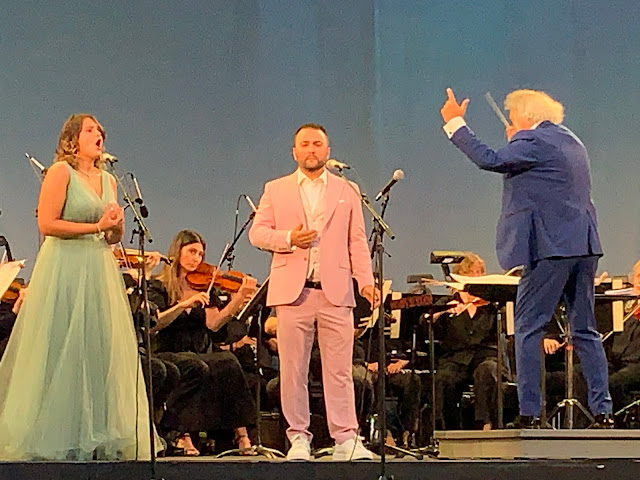Chiara Cremaschi, Alessandro Loro, and Maestro Diego Basso
The weather was perfect, the crowd was enthusiastic, and New York City Opera (The People's Opera) is to be thanked for giving New Yorkers two generous and excellently curated programs in one glorious weekend. Last night's program comprised mostly Italian opera , Neapolitan songs, and some instrumental works for good measure. It was indeed "A Grand Night for Singing"!
From the point of view of a true opera lover, the amplification precluded any assessment of the artistry of the singers. What we could observe is stage presence. For all we know, Alessandro Lora may be the tenor of tomorrow; and given good direction on the opera stage he may also be a convincing actor. However, last night he relied completely on exaggerated stock gestures and "money notes" produced at maximum volume. Perhaps the amplification was at fault because he sounded better during the pianissimi passages.
Sound design is a mystery to us but the balance of the excellent New York City Opera Orchestra was mostly way off and the esteemed musicians sounded nothing like they do in a concert hall. The oboe solo in Morricone's "Gabriel's Oboe" sounded more like a harmonica than an oboe. Perhaps an acoustic engineer could explain this to us. Nonetheless, we decided that one doesn't need to apologize for "film music" which sounds much better than contemporary "academic music". As we said in last night's review, in order to succeed, music must be melodic. Morricone's music fulfilled that requirement.
Co-starring with Mr. Lora was the lovely soprano Chiara Cremaschi who seemed to have the chops to tackle roles as diverse as Queen of the Night from Mozart's Die Zauberflöte and Lauretta in Puccini's Gianni Schicchi. Like her tenor stage companion, she did not know what to do with her arms. Whereas Mr. Lora opened wide and reached for the sky, Ms. Cremaschi kept hers folded over her midsection. We deleted dozens of photos which made her look insecure-- until we found one in which she used her arms. Neither singer looked natural. Overly expansive stock gestures look trite and cocky whereas folded arms not only look insecure but create a hunched over posture. None of the gorgeous gowns worn by Ms. Cremaschi could compensate. We wanted so badly to get her to stand up elegantly and use gesture to create character!
Possibly had we been able to appreciate the voices we might not have noticed this failure of stage presence. We might add that most people were there to have a good time, to sit outdoors in the grass and be entertained. They seemed happy to clap along in the "Libiamo" from Verdi's La Traviata. Perhaps they couldn't see the stage as we could way down front. Perhaps television has "taught" people what to expect from opera singers. Perhaps subtlety is not possible in an amplified outdoor environment.
As far as the conducting both Maestri seemed in control of the orchestra and, for all we know, standing up there on the podium had no idea of what their musicians sounded like to the audience. Maestro Diego Basso conducted one of his own compositions entitled "Vigneti come Pentagrammi" which we hope we get an opportunity to hear under more sanguine circumstances. He also conducted an arrangement of "Core 'ngrato" sung by Mr. Lora.
Part of the program was conducted by Maestro Maurizio Barbacini and he kept the orchestra full of energy in the "Prelude" from Bizet's Carmen. That and the Mozart were the only two numbers on the generous program which were not Italian.
We are looking forward to Gounod's Romeo et Juliette on September 8th which, we expect, will be performed with sets and costumes. Perhaps the sound will be more acceptable.
© meche kroop

No comments:
Post a Comment